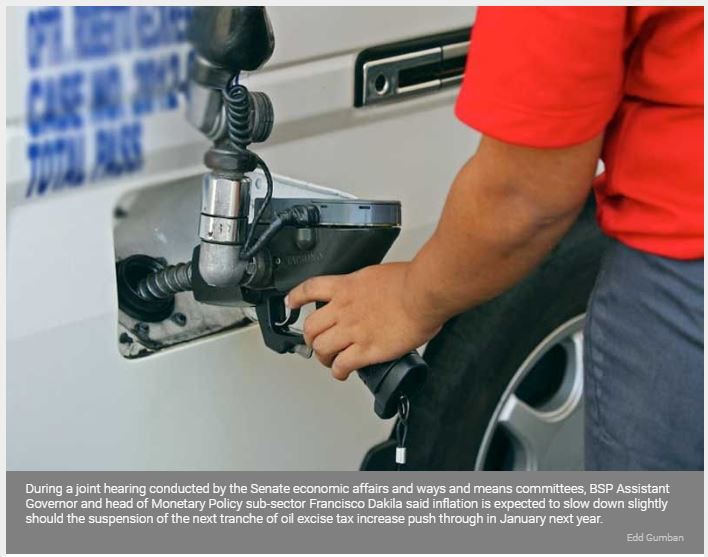Philippines: Suspension of fuel excise tax to ease inflation
MANILA, Philippines — The proposed suspension of the next increase in fuel excise taxes is expected to cut inflation by 0.2 percentage point in 2019 if implemented for the entire year, according to the Bangko Sentral ng Pilipinas.
During a joint hearing conducted by the Senate economic affairs and ways and means committees, BSP Assistant Governor and head of Monetary Policy sub-sector Francisco Dakila said inflation is expected to slow down slightly should the suspension of the next tranche of oil excise tax increase push through in January next year.
“For the full-year, if excise tax is suspended for the whole of 2019, we see inflation coming down by 0.2 percentage point,” Dakila said.
However, Dakila clarified that the suspension’s impact to inflation would be correspondingly lower should it take effect for only a few months.
Currently, the conditions for the resumption of the excise tax hike is not yet clear, pending the issuance of the relevant implementing rules and regulations.
Dakila said the estimate is also based on the assumption that the futures prices of Dubai crude oil remain below an average of $80 per barrel in 2019.
“Right now, the futures prices for 2019 already goes below $80 per barrel. The average for 2019 is at $78.25 per barrel, this is as of Oct. 16” he said.
However, the BSP official warned that should Dubai crude oil prices rise above $80 per barrel for the whole of 2019, the suspension’s impact to inflation would be softened, and result in a net reduction of only 0.1 percentage point.
He said this could trigger another suspension in oil excise increase the following year, and lessen inflation by another 0.3 percentage point by 2020.
The BSP expects inflation to settle at 4.3 percent in 2019 and 3.2 percent in 2020.
With plans to defer the next fuel excise increase and the expected passage of the Rice Tariffication Bill — which is seen to reduce inflation by 0.7 percentage point — Dakila said inflation could further be decreased to 3.4 percent by 2019.
This is within the Development Budget and Coordination Committee’s (DBCC) inflation target of three to four percent for next year.
The Department of Finance (DOF), for its part, estimated that the oil excise suspension in January would slash inflation by 0.3 percentage point next year.
“When we proposed the TRAIN, we also presented that the 2019 additional (hike) may increase inflation by additional 0.3 percentage point. So to answer your question, we will not see that 0.3 percentage point (increase) if the suspension is for the whole year,” Finance undersecretary Karl Kendrick Chua told Senate Economic Affairs Committee Chairman Sherwin Gatchalian.
“If it is less that a full year, it will be a fraction of that,” he said.
Source: https://www.philstar.com/business/2018/10/25/1862853/suspension-fuel-excise-tax-ease-inflation#8TsfYvEo0iQ357RW.99


 Thailand
Thailand




